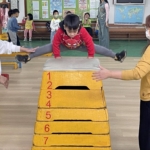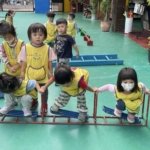A child is a human being from the beginning of life until adulthood. However, the age range of childhood varies.[1][2] The definition in more countries is the same as that of the United Nations. [1][2] While more countries have the same definition as the United Nations Convention on the Rights of the Child, a child is any human being below the age of 18 years, unless under the law applicable to him or her he or she is under 18 years of age. Child can also be used to refer to a "child"; in certain circumstances, it is possible to speak of a human being as a "child of nature" or an "old child". Children are the most vulnerable group in human society and should be protected in every way.
This ranges from the law to society to the family. Legally, child abuse is prohibited in most countries, and child labor is an international practice. In society, the protection of children's physical and mental health and development is the key. The development of children, i.e. childhood, is something that everyone experiences, and it is the future of mankind. Children also have their own special pastimes and recreational activities. From the 16th and 17th centuries, it was realized that children were no longer reduced adults.
Child Development
It is the development of mental, emotional, cognitive, and behavioral abilities as well as their functioning during childhood. Childhood is generally from the ages of two or three to twelve or thirteen. The beginning of a child's development is marked by language skills. At age 1 or 2, children learn to pronounce simple sounds; at age 2, they usually recognize words and begin to understand simple rules of pronunciation and word formation; at age 3, they should be able to learn shorter sentences; at age 4, they can imitate the tone of voice of adults; and at age 5 or 6, they should be able to grasp a certain amount of syntax and understand the meaning of words. The early years (ages 2-7) are also the years when children learn to use formal thinking and symbolic language to describe their environment. They should be able to use their own symbols, concepts, and ideas to abstractly understand the information they receive from the world around them. In the later years of life (7-12 years), children begin to develop logical thinking, which involves categorizing concepts and understanding the concepts of space and time and mathematics.
Children's memory and the cognitive abilities that are gained from memory develop continuously during childhood. Along with the development of short- and long-term memory, children's memories develop so that they can retrieve the information they need from them more quickly and efficiently. As children develop self-awareness of their emotions, dispositions, and abilities, they should learn to respond to changes in the people and things around them, for example, by understanding and empathizing with others, by learning to think differently, and by taking into account the feelings and interests of others; this is a type of social awareness that is important for the establishment and development of one's moral character. Children's moral development may be a result of blaming parents for their behavior or failing to gain parental approval. An important sign of a child's emotional development is his or her sense of identity, the need to understand who he or she is and to learn how to recognize his or her place in the world around him or her. Gender identity should be an extremely important form of self-awareness that develops after the age of three. The emergence of secondary sexual characteristics and the development of logical thinking should be the hallmark stages of childhood.
Although Judy Harris' book The Myth of Parenting suggests that parenting does not have much impact on children's development, the general consensus in the academic community is that both innate and acquired factors have an impact on psychological development, and that among the acquired factors, the impact of parenting is undeniable. Research has generally concluded that, regardless of other innate and acquired factors, parenting itself has an effect on children's future achievement ranging from 20% to 50%. In addition, all parents have their own parenting styles, which, according to Kimberly Kopko, can be "defined on two levels: Control and Warmth. Control refers to the degree to which parents manage their children's behavior; warmth refers to the degree to which parents accept and respond to their children's behavior." [





